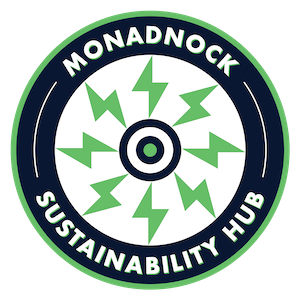By Patricia Beffa-Negrini, Ph.D. Originally Published in The Monadnock Shopper News, Green Monadnock column, July 2024.
As a dietitian/nutritionist witnessing recent extreme weather, my concerns about feeding the world keep me up at night. Most of our food is transported from far away, requires too much water to grow, depletes the soil and other resources, and adds excess waste and pollution to the environment. Plus, while emissions in the US from electricity and industry are decreasing, food and agriculture emissions are rising, contributing about a third of all climate-warming gases.1 Instead, we need a reliable, climate-resilient, and nutritious New England-based food system.
What’s a “food system”?
A “food system” includes producing, processing, packaging, distributing, selling, preparing, and disposing food from farms and oceans. Building a regional food system could help lower climate pollution while preparing us for disruptive weather events and public health emergencies like COVID-19.
In 2014, when New England was importing about 90% of our foodstuffs, a Food Solutions New England (FSNE) report2 envisioned producing 50% of our food supply from local sources by 2060. The researchers concluded that the region could supply half of our sustenance. Given all the competition for land in our area, it will take careful forethought and planning to set aside quality farmland and identify other less-arable acres for housing, forest, solar farms, etc. Plus, we must distribute food equitably so no one goes hungry during droughts and floods.
If we ate a healthier, more resilient diet, could our food be supplied regionally?
In 2023, FSNE researchers published how New Englanders’ eating habits must change to match what regional food producers could grow, harvest, and catch.3 They found that to reach “Resilient Eating,” we must eat 600 fewer calories per day and cut sugar intake in half; currently, we consume an average of 2,940 calories, including alcohol, and about 20 teaspoons of sugar daily. Resilient Eating would be a plus for our health and waistlines.
We would also need to eat more local fruits, vegetables, and fish—and fewer fats, sweets, and caloric beverages. Specifically, this means 3 cups of local vegetables daily, about twice as much as we eat now on average. We’d also need to double our fruit intake to 2 cups of whole fruit (not juice). Grain consumption wouldn’t change—though it would be healthful if we ate more whole grains. Dairy consumption would also stay the same at 1.5 cup equivalents per day, less than the Dietary Guidelines for Americans, but supported as healthful by nutrition experts. We must cut fats and oils in half to about 6-7 teaspoons daily.
Protein intake is more complicated, but recommendations boil down to 2 large eggs per week (about the same as today); 5 servings of poultry per week (about the same as today); 2 servings per week of beef, veal, lamb, or goat (much less than today) and 2 of pork (less than today). The panel recommended a sustainable 1-2 servings per week for fish—just a half-ounce increase from current consumption levels. Finally, a combination of nuts, soy, and beans amounting to roughly 1/4 cup daily, just a quarter ounce more than we eat now, would fulfill the remaining protein requirement.
Many do not want to hear, “Eat less meat.” However, let’s compare burning coal, our dirtiest fuel, to producing beef. Burning 1 pound of coal releases 4 pounds of carbon into the air—producing 1 pound of beef releases 100 pounds!1 Small changes in meat consumption can make a big difference.
How can we help build our regional food system?
One delightful and delicious way to start building a regional, resilient food system is to participate in NH Eats Local Month.4 This August, promotions throughout the state highlight local growers, farmers’ markets, and farm-to-table fare. Consider exploring new eatables and eateries. Participate in a Community Supported Agriculture (CSA) garden, pick local fruits and veggies, plant a garden, avoid wasting food, and compost scraps.
Resilient eating supports local economies, promotes health, and prepares us for disruptive weather. We have the tools we need. Let’s champion local food—a yummy way to address climate challenges.
- www.ted.com/talks/jonathan_foley_the_problem_with_food_and_climate_and_how_to_fix_it
- www.foodsolutionsne.org/a-new-england-food-vision/
- www.nefoodsystemplanners.org/wp-content/uploads/NEFNE_Executive-Summary.pdf
- www.nheatslocal.com/nh-eats-local-month/
Patricia Beffa-Negrini, Ph.D., is a retired Registered Dietitian/Nutritionist who lives in Nelson and is a member of Partners’ Gardens CSA. She is also a Board member of the Monadnock Sustainability Hub, a New Hampshire nonprofit that aims to cut emissions from our region and thus address climate pollution. Her email is nelsoncommunitypower@gmail.com.
